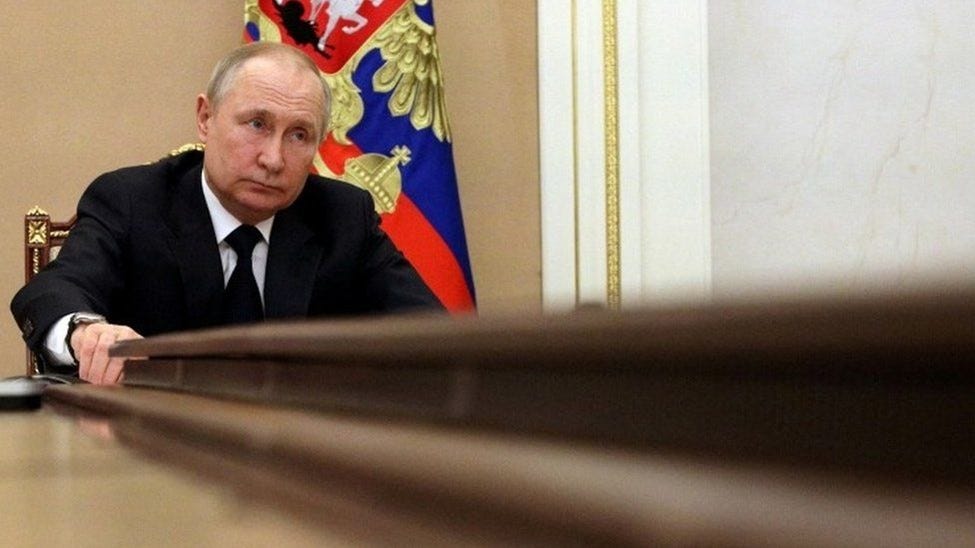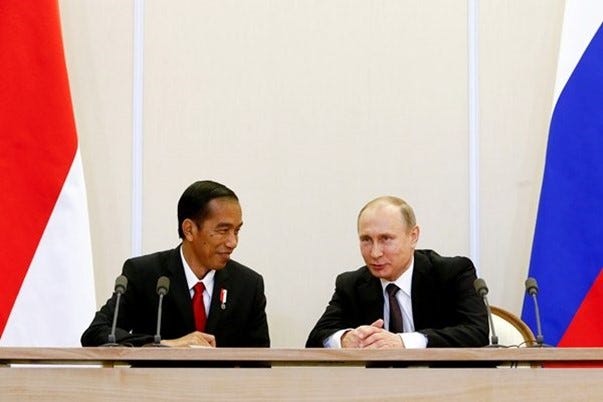By: the Asia Sentinel staff
The remark by Russia’s ambassador to Indonesia that Russian President Vladimir Putin intends to attend a G20 summit hosted by Indonesia later this year dumps Jakarta into a dilemma that it really wants nothing to do with and appears unprepared to deal with.
When Indonesia sought to lead the Group of 20 most economically important nations in more halcyon days last year, it was a satisfying signal that the country of 270 million strong and the biggest economy in Southeast Asia had arrived on the international scene. Now that it has attained that position, it appears paralyzed in the face of a nearly unprecedented crisis, the biggest invasion of a sovereign European nation since World War II. President Joko Widodo, who aspires to be an international figure representing a huge democratic nation, seems to have little idea how to go about making his mark. Retno Lestari Priansari Marsudi, the 60-year-old Minister for Foreign Affairs, seems equally at sea.
Indonesia was envisioning the upside of a diminishing Covid-19 crisis and at the opportunity to take the leadership in transforming what officials looked forward to: the Global Health Architecture, Sustainable Energy Transition, and Digital Transformation. Now that is secondary. While the G20 may be focused on economic and not political issues, Russia’s actions, with its brutal invasion of its neighbor Ukraine, are threatening at least as much global economic damage as the Covid-19 pandemic.
Having Putin, an international pariah, show up in Bali presents Jokowi, as the president is known, with the unenviable duty of throwing him out – or not, and risking global scorn.
“So far, Indonesia seems reluctant to denounce the Russian invasion, other than voting for the General Assembly resolution (condemning it),” said a western political analyst. “This is a bit sticky. This would be an opportunity for Indonesia to take the lead on that and show some balls on an international issue but so far it seems to be following China's lead and trying to stay out of it.”
If Indonesia wants to be a global power, then it has to act like it, said a Jakarta-based western businessman. “Ukraine is just the latest case but if Jakarta is going to hide its head in the sand while it’s in the president's chair of the G20, it speaks volumes about its inability to take a serious role in world and even Asian affairs."
So far, Indonesia has made no attempt to use its position to rally the majority of G20 members to take a stand. Policymakers need to understand that being a big country sometimes means having to make uncomfortable choices in international affairs. The attitude of trying to be nice to everyone simply does not make sense whether in approaching the Ukraine situation, let alone in protecting its own seas and exclusive economic zone resources from another expansionist power.
For a long time, Indonesia has coasted along seeing itself as the de facto leader of the Association of Southeast Asian Nations simply on account of its size and role in the group’s formation in 1967. The fact that the regional grouping is a spent force in international affairs is at least in part due to Indonesia’s reticence.
Now that Jakarta is at the world’s top table, the only member from a Southeast Asia with 600 million people, nations mostly highly dependent on international trade and hence of international rules, it has a duty to act accordingly. Otherwise, its claims of importance are no more than a tourist brochure.
While some other countries in Asia, notably India and Vietnam, have been reluctant to criticize Russian aggression whether because of historical links or their dependence on Russian arms, Indonesia faces no such conflict. Its military has little Russian equipment, and Russia is insignificant in trade and investment.
As a large but non-nuclear state, Indonesia has a role in isolating the aggression of a big, nuclear-armed nation against a smaller one which traded its nuclear weapons for international promises of security. If the Russians play this game, China could seize its smaller, non-nuclear neighbors anytime it wants. Meanwhile, the Ukraine example will surely lead to more small and medium powers seeing nuclear weapons as their best defense. Non-proliferation will be dead.
Non-alignment today doesn’t mean non-involvement just as it didn’t mean doing nothing in the 1960s and 70s in the face of imperialism of various kinds. The future of the world should lie with what are now middle powers, not old empires trying to survive or re-create themselves. Ukraine’s desire to pursue its own path of relationships rather than accept Russian hegemony is precisely what countries such as Indonesia need to defend, not as support for the EU and NATO but as end in itself.
Indonesia is doubly well-equipped to use its G20 position to represent broad Asian and also non-nuclear middle power interests as well as the principles of world order. It is able to do so because it has a president who was elected and, whatever his faults, is neither a megalomaniac, kleptomaniac, nor owes his position to his parents. Indeed, he has some things in common with Ukraine’s embattled President Zelenskyy.
As we reported earlier, Indonesia has not always had such an insignificant role on the global stage. President Sukarno, ably assisted by foreign minister Subandrio and Ruslan Abdulgani, organized the 1955 Bandung Conference of Afro-Asian nations, which saw the birth of the non-aligned movement whose leaders included Yugoslavia’s (Communist) President Tito, as much an opponent of Soviet Russian imperialism as was Sukarno of European imperialism.
That was followed in 1957 by Indonesia’s then-revolutionary Declaration of Sovereignty over the seas connecting its islands eventually led after decades of effort to the acceptance of the archipelagic principle now enshrined in the UN Convention on the Law of the Sea.
That owed much to the efforts of two foreign ministry officials, Hasjim Djalal and Mochtar Kusumaatmadja, the latter foreign minister for a decade under Suharto. It is time for Indonesia today to stop hiding behind Mr. Nice Guy platitudes and follow such bold examples. Jokowi has been given a place on the world stage at a crucial time.





If Indonesia have any credibility or showed leadership, it should condemn the Russian invasion first, and tell Putin not to come, otherwise Indonesia will have no face as it shows itself as outwardly supporting the Russian aggresion and invasion of Ukraine. It will remind other asian country and malaysia of what they( Indonesia) tried to do in the 60's when they tried to invade malaysia.
Your team writes an insulting article to this nation claiming that its leaders is lost at sea even before they decide. In fact you are pushing for the decision you like to see ignoring that Indonesia should and will act in her own interest, not the west media's. Just because Biden says Russia is to be kicked out of the G20, do you expect Indonesia simply act like a lapdog like so many of you? I have been looking for good journalism to subscribe to and AS is failing the test.